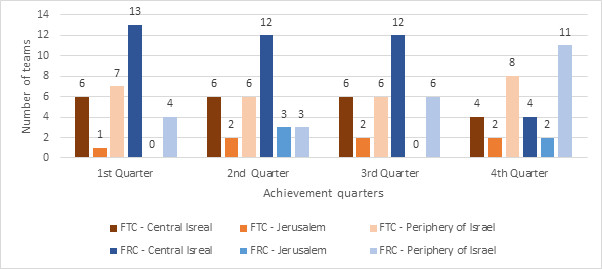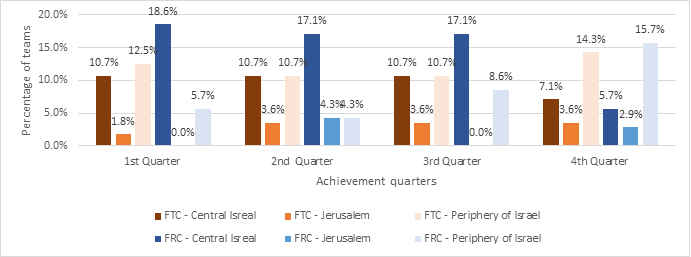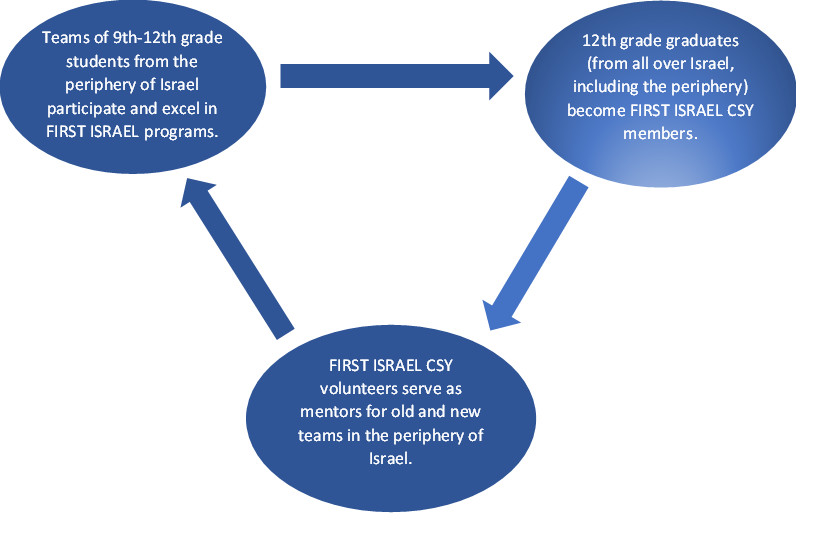Communications of the ACM
Creating Organizational Sustainability by Connecting to National Core Values
FIRST is an international organization that promotes STEM education worldwide, among children of all ages, from pre-school to high school, using robotics programs and competitions. In Israel, FIRST offers four programs for participants of different age groups: the FIRST Robotic Competition (FRC), which is the most advanced of the four programs and is aimed at 9th-12th grade students, the FIRST Tech Challenge (FTC) for 8th-12th grade students, the FIRST LEGO League Challenge (FLL CHALLENGE) for 4th-9th grade students, and the FIRST LEGO League Explore (FLL EXPLORE) for pre-school-4th grade students.
Table 1 shows how the FRC and FTC programs manifest in Israel. Information on FLL CHALLENGE and EXPLORE is currently unavailable.
Table 1: Data on FRC and FTC programs and percentage of population in Israel
|
DATA |
FRC |
FTC |
|
|
Number of teams in 2022-23 |
70 |
57 |
|
|
Percentage of teams located in central Israel (between Hadera and Gedera, Jerusalem excluded) |
55.7% |
42.1% |
45.3%
|
|
Percentage of teams located in southern Israel |
15.7% |
12.3% |
14.2% |
|
Percentage of teams located in northern Israel |
21.4% |
35.1% |
27.7% |
|
Percentage of teams located in Jerusalem |
7.2% |
10.5% |
12.8% |
Despite its success on the national level, as Table 1 indicates, FIRST ISRAEL is highly dominant in the central part of Israel, relative to the periphery, similar to Israel's general population distribution; i.e., 55% of the teams are located in central Israel, while 45% are distributed throughout the rest of the country. However, a closer look at the achievements of both FRC and FTC teams shows that teams in central Israel generally do better than those located in the periphery (Figures 1 & 2). Although the data presented here refers to the 2022-2023 year, data for previous years show the same trends.

Figure 1. Geographical distribution of FRC and FTC teams (in numbers) in Israel by achievement quarters, 2022-2023

Figure 2. Geographical distribution of FRC and FTC teams (by percentage of total teams in each program) in Israel by achievement quarters, 2022-2023
In other words, although the distribution of teams in the program reflects quite closely the geographical distribution of the population in Israel, a comparison of the actual achievements of the teams from the center, Jerusalem, and the periphery (north and south of Israel), reveals significant differences between the teams from the center, Jerusalem, and the periphery.
Specifically, in the FRC program, in the first three quarters of team achievements, there are mainly groups from the central areas of Israel, yet in the fourth and lowest quarter of team achievements, there are mainly groups from the periphery. In the FTC program, in the first three quarters the achievements of teams from the center and the periphery are the same, yet though the numbers are small, in the fourth quarter, this equality is broken and the inferiority of groups from the periphery is visible.
To address this imbalance, FIRST ISRAEL decided in 2022 to increase its presence and excellence in the Israeli geographic periphery by implementing an innovative plan that exploits Israel's social orientation, as well as its strength in STEM education.
Israel is known for its high social involvement in the education system. For example, there are 4,868 educational NGOs operating in Israel compared, for example, with 47 in Switzerland and 47 in Austria, both of which have similar populations to Israel. Many of these Israeli NGOs focus on human values; many focus on STEM education. One kind of NGO that focuses on values is the Community Service Year (CSY), where high school graduates volunteer for one year before their mandatory army service. The CSY participants live in groups of 7-12 and lead a commune-like lifestyle. Most CSY programs focus on working with underprivileged children in towns in the social and/or geographic periphery of Israel, or in boarding schools for children who reside there by court order. While the main role of CSY participants is to help the children with their schoolwork and create extra-curricular activities for them, they also serve as role models and become their "big brothers/sisters." This experience increases the CSY participants' awareness to the diversity of human beings, teaches them humility and humanity, helps develop their maturity during a year of independent living in a group, and enhances their leadership skills.
As part of its attempts to mitigate the imbalance described previously, FIRST ISRAEL decided in 2022 to exploit the extensive experience gained in Israel with CSY programs and launched its own CSY program to increase its presence and the teams' success in Israel's social and geographic periphery. Unlike all other CSY programs which, as mentioned above, focus almost solely on values, FIRST-CSY integrates STEM education with the general CSY values. Thus, the volunteers in FIRST-CSY not only have a social orientation, but they are also excelling graduates of the FTC and FRC programs. Specifically, in the first year of FIRST-CSY (2022-2023), most of the volunteers came from teams in the first and third quarters of team achievements; in the second year of FIRST-CSY (2023-2024), all the volunteers will come from teams in the first and second quarters. Thus, the FIRST-CSY program addresses the need to strengthen the groups from the periphery by introducing volunteers (FIRST-CSY members) who serve as mentors (adult leaders) to the teams in the periphery, bringing with them their experience working in strong teams in both the FTC and FRC programs.
Two locations were chosen for the of the FIRST-CSY program: Jerusalem, in aim of increasing the number of FTC and FRC teams in the city; and Be'er Sheva, in aim of promoting excellence among the teams in the southern periphery of Israel. Nine volunteers live in Jerusalem and mentor teams in two local municipalities, and nine other volunteers live in Be'er Sheva (in the south of Israel) and mentor teams in eight municipalities in the vicinity. In total, the volunteers mentor teams in 52 schools, of which they lead 39 FLL CHALLENGE teams and 85 FLL EXPLORE teams in elementary schools in the mornings, and seven FTC teams and 8 FRC teams in the afternoons and evenings. Furthermore, since they themselves have participated in FIRST tournaments as high school pupils and are familiar with its administrative and professional aspects, the volunteers also perform various duties during the tournaments as members of FIRST ISRAEL.
The unique contribution of the FIRST-CSY first year cohort is reflected in the following data: Out of 20 new teams established in Israel during the 2022-23 season (18 new FTC teams and two new FRC teams), six new teams (four FTC, two FRC) were established by the FIRST-CSY participants. Furthermore, two of the four new teams in the FTC program achieved high rankings in the FTC national competition (places four and 10 in the 24-team division tournaments).
Besides achieving the goals of the CSY, FIRST-CSY also contributes to the sustainability of the organization FIRST ISRAEL itself by implementing the Cross-Sectorial Collaborative Shared Value (CS)2V Strategy (Hazzan et al., 2021). The (CS)2V strategy directs organizations' social investments by connecting a corporation's core business need, from the corporate perspective, with a social core need, from the social perspective. Hazzan and her colleagues (2021) demonstrate the implementation of the (CS)2V model by presenting the example of Intel, a for-profit organization. FIRST-CSY, demonstrates the implementation of the (CS)2V model by a third sector, i.e., non-profit organization.
Specifically, on the one hand, the FIRST-CSY framework addresses a social need: FIRST-CSY participants, who are excelling graduates of the FTC and FRC programs, serve as educators and strengthen scientific and technological education in Israel, especially in its social and economic periphery. On the other hand, the FIRST-CSY program creates sustainability for the organization by training the next generation of mentors (graduates of the teams from the periphery that the FIRST-CSY participants themselves mentor), whether in existing teams or new teams they launch, as illustrated in Figure 3. In turn, this process strengthens Israel as a technological superpower by strengthening STEM education in the periphery.

Figure 3. FIRST-CSY sustainability strategy
Summary
FIRST ISRAEL demonstrates how the (CS)2V strategy can be implemented not only by for-profit organizations, but also by non-profit NGOs. In general, if a STEM organization (either educational or not, either for profit or not) wishes to establish a STEM education program, then in order to ensure the organization's sustainability, the program must reflect a certain degree of connection between the organization's core business and some need of society that relates to STEM education. Such programs not only contribute to society while helping meet a national need for STEM professionals, but also ensure sustainability of the program itself and of the organization.
Reference
Hazzan, O., Lis-Hacohen, R., Abrahams, B. and Waksman, M. (2021). The (CS) 2V— Cross sectorial collaborative shared value—strategy, Blog@CACM, January 11, 2021.
Orit Hazzan is a professor at the Technion's Department of Education in Science and Technology. Her research focuses on computer science, software engineering, and data science education. For additional details, see https://orithazzan.net.technion.ac.il/. Zafit Lukach is a doctoral candidate at the Technion's Faculty of Education in Science and Technology. She has experience with community service year programs and is a mentor of two FTC robotic teams.
No entries found